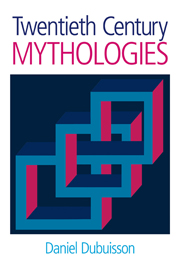Book contents
- Frontmatter
- Epigraph
- Contents
- Foreword by Professor Robert A. Segal
- Preface
- Abbreviations
- Introduction: History and comparative epistemology
- Part I Georges Dumézil, or Society
- Part II Claude Lévi-Strauss, or the Mind
- 7 The symbolic order
- 8 The Mythologiques: from overture to finale
- 9 From Marx to Kant
- 10 The semantics of myth
- 11 A Buddhist among the Bororo
- Part III Mircea Eliade, or the Sacred
- Conclusion: Modern theories of myth and the history of Western thought
- Bibliography
- Index
9 - From Marx to Kant
from Part II - Claude Lévi-Strauss, or the Mind
- Frontmatter
- Epigraph
- Contents
- Foreword by Professor Robert A. Segal
- Preface
- Abbreviations
- Introduction: History and comparative epistemology
- Part I Georges Dumézil, or Society
- Part II Claude Lévi-Strauss, or the Mind
- 7 The symbolic order
- 8 The Mythologiques: from overture to finale
- 9 From Marx to Kant
- 10 The semantics of myth
- 11 A Buddhist among the Bororo
- Part III Mircea Eliade, or the Sacred
- Conclusion: Modern theories of myth and the history of Western thought
- Bibliography
- Index
Summary
Contrary to what one might expect, the Mythologiques do not open with a definition of myth or religion, but rather with the statement of a very general philosophical problem. The first lines of the first volume in fact propose to define the terms of a particular type of concrete logic; for, without forgetting or denying the sensible qualities of things, this logic will first be constructed on the linguistic signs endowed for the moment with an unusual definition:
At the beginning of this introduction I explained that I had tried to transcend the contrast between the tangible and the intelligible by operating from the outset at the sign level. The function of signs is, precisely, to express the one by means of the other. Even when very restricted in number, they lend themselves to rigorously organized combinations which can translate even the finer shades of the whole range of sense experience. We can thus hope to reach a plane where logical properties, as attributes of things, will be manifested. … Our task, then, is to use the concept of the sign in such a way as to introduce these secondary qualities into the operations of truth.
(RC, 14)To understand this definition, from which we especially cite the affirmation about the reciprocal transparency of the linguistic sign, the logical category, and the sensible quality, we must try to bring together the ensemble of Lévi-Straussian philosophical postulates.
- Type
- Chapter
- Information
- Twentieth Century Mythologies , pp. 141 - 152Publisher: Acumen PublishingPrint publication year: 2006



